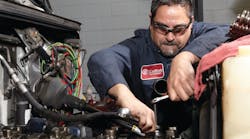Former Secretary of Defense Donald Rumsfeld stated, "Be precise. A lack of precision is dangerous when the margin of error is small." When it comes to transportation, small mistakes can cause major problems. Especially in today's constantly evolving world of transportation - with increasing shipper demands, government regulations, technological advances and safety compliance issues - commercial vehicle fleets must to be ever vigilant in order to stay safe and remain successful.
To help vehicle maintenance managers overcome many of the challenges around attentiveness and accuracy, the TMC (Technology and Maintenance Council) - has created this year's annual fall meeting around the theme: "Precision Maintenance." The meeting is set for Sept. 9 to 12 at the David L. Lawrence Convention Center in Pittsburgh, PA.
With its diverse membership of equipment managers, service dealers, owner operators, industry suppliers and manufacturers, educators, academia and others that support the trucking industry, TMC (tmc.trucking.org) works together to improve transport equipment, its maintenance and maintenance management. It is a technical council of American Trucking Associations (ATA) (www.trucking.org) - the national trade association for the trucking industry.
TECHNICAL SESSIONS
The TMC Fall Meeting always features a comprehensive collection of equipment related educational sessions. Among the sessions set for this year are:
- CSA and Its Impact on Maintenance. This session is all about the CSA (Compliance, Safety, Accountability) - the Federal Motor Carrier Safety Administration (FMCSA) initiative to improve large truck and bus safety. In addition to fleet, enforcement and regulatory officials sharing their perspectives on how CSA is impacting vehicle maintenance, attendees will hear from Anne Ferro, FMCSA Administrator. She will present an update on CSA and discuss the Vehicle Maintenance BASIC (Behavior Analysis and Safety Improvement Category) that is among six other BASICs considered under CSA in ranking a fleet's safety performance.
- How to Conduct a Proper Pilot Review. The ways to conduct a proper pilot review to avoid unnecessary production problems that are not up to the expectations of a fleet is the subject of this session. The latest TMC Recommended Practices being developed for conducting pilot reviews will be presented.
- Secrets of Hiring and Retaining Top Talent. The president of StaffDynamics, Daniel Abramson - a respected and experienced staffing industry executive and business coach, will provide attendees with the necessary skills to conduct effective employment interviews, screen out potential problem employees and evaluate candidates objectively.
- Interior Cab Corrosion: Where Did My Floorboards Go? This session focuses on the damage that can occur to the cab interior that oftentimes goes unnoticed until the corrosion is irreversible. Attendees will learn ways to prevent the corrosion of interior cab components so the lifetime of vehicles can be lengthened.
STUDY GROUP SESSIONS
Among the TMC Study Group meetings taking place at the fall meeting are:
- Strategies for Managing Driver Electrical Needs. This session discusses how to better manage the electrical needs of drivers to power their in-cab comfort and entertainment devices. Topics to be addressed include how to maximize battery life and increase the electrical system lifespan.
- Shop Talk for Tires and Wheels. This will be an interactive, open dialogue that looks at real tire and wheel problems. Expert panelists will explain the issues and how to fix them, as well as how to avoid them in the future.
- Best Practices for Using/Managing Engine Software Tools. The focus of this session will be using and managing engine software tools. Software maintenance, maintaining and protecting engine parameters, extracting engine fault codes and diagnostics and evaluating third-party and bundled software packages will be among the subjects covered.
- How to Address Distracted Driving. In this session, attendees will learn in detail about the relationship between distracted driving and crash causation, and what a fleet can do to mitigate the problem. Panelists will include fleet and government representatives, as well as researchers from the Virginia Tech Transportation Institute.
- CVSA Out of Service Suspension Inspection Criteria. Commercial Vehicle Safety Alliance out-of-service conditions for suspensions is what this session devoted to. Attendees will also learn what inspectors have seen during roadside inspections related to the newer suspension designs.
- Trailer Stability Control: Minimize the Rock N' Roll. This session will demonstrate how vehicle stability systems work with other vehicle systems to detect and intervene to prevent crashes related to rollover and loss of control. Also discussed will be new technologies for trailers that can increase stability.
- My Fleet Average MPG: Where Does It Come From? During this session, fleet representatives and manufacturers will discuss the benefits of understanding asset duty cycles and how compiling operational conditions information and energy use data can aid fleets in developing best practices for fuel economy management.
- Emissions Tampering: What Your Fleet Needs to Know. The purpose of this session is to emphasize the illegality of emissions tampering and the consequences associated with it. Emissions specialists from the EPA and the major engine manufacturers will also provide examples of emissions tampering and show how fleets and service providers can detect tampering during routine maintenance and repair procedures.
- General Guidelines for Security Risk Analysis of Electronic Driver Log Systems. This session will discuss potential security risks associated with electronic driver log systems and the security controls that can address these vulnerabilities.
- Should You Be Spec'ing Gas or Diesel for Your Light and Medium Truck Fleet? Attendees of this session will learn the advantages and disadvantages of spec'ing gasoline and diesel engines in Class 2 through 6 vehicles. A panel of fleets and manufacturers will shed light on this ongoing debate for current models, as well as for models to come in the next several years.
Complete details on the 2013 TMC Fall Meeting, plus registration information, can be found at tmc.trucking.org or by calling TMC at (703) 838-1763.



